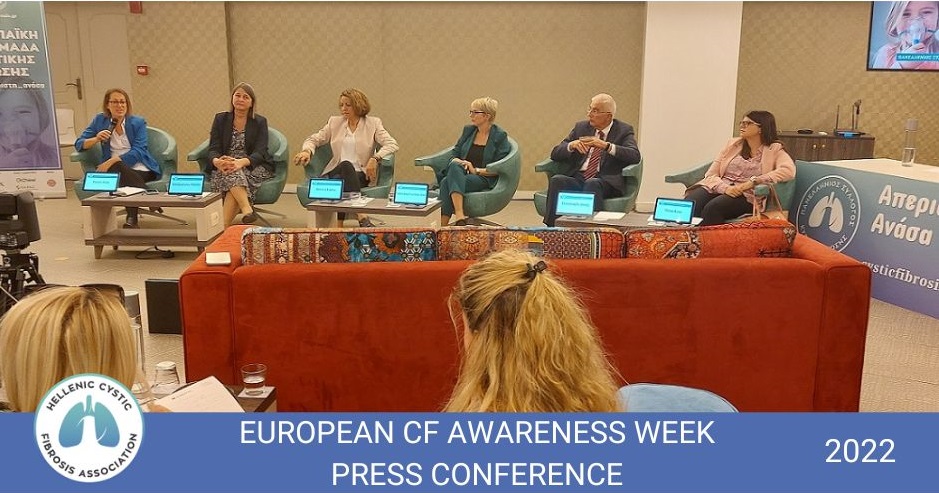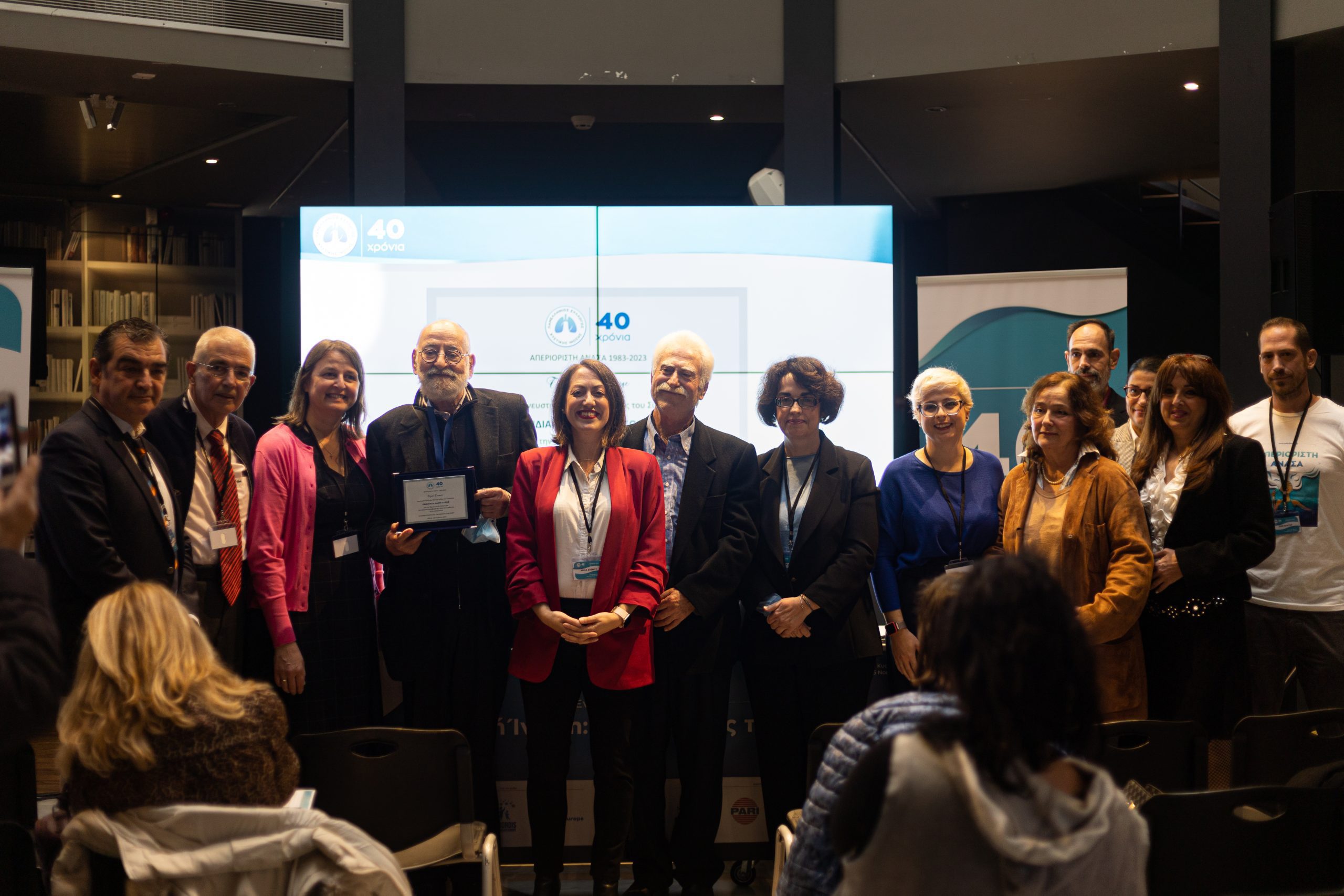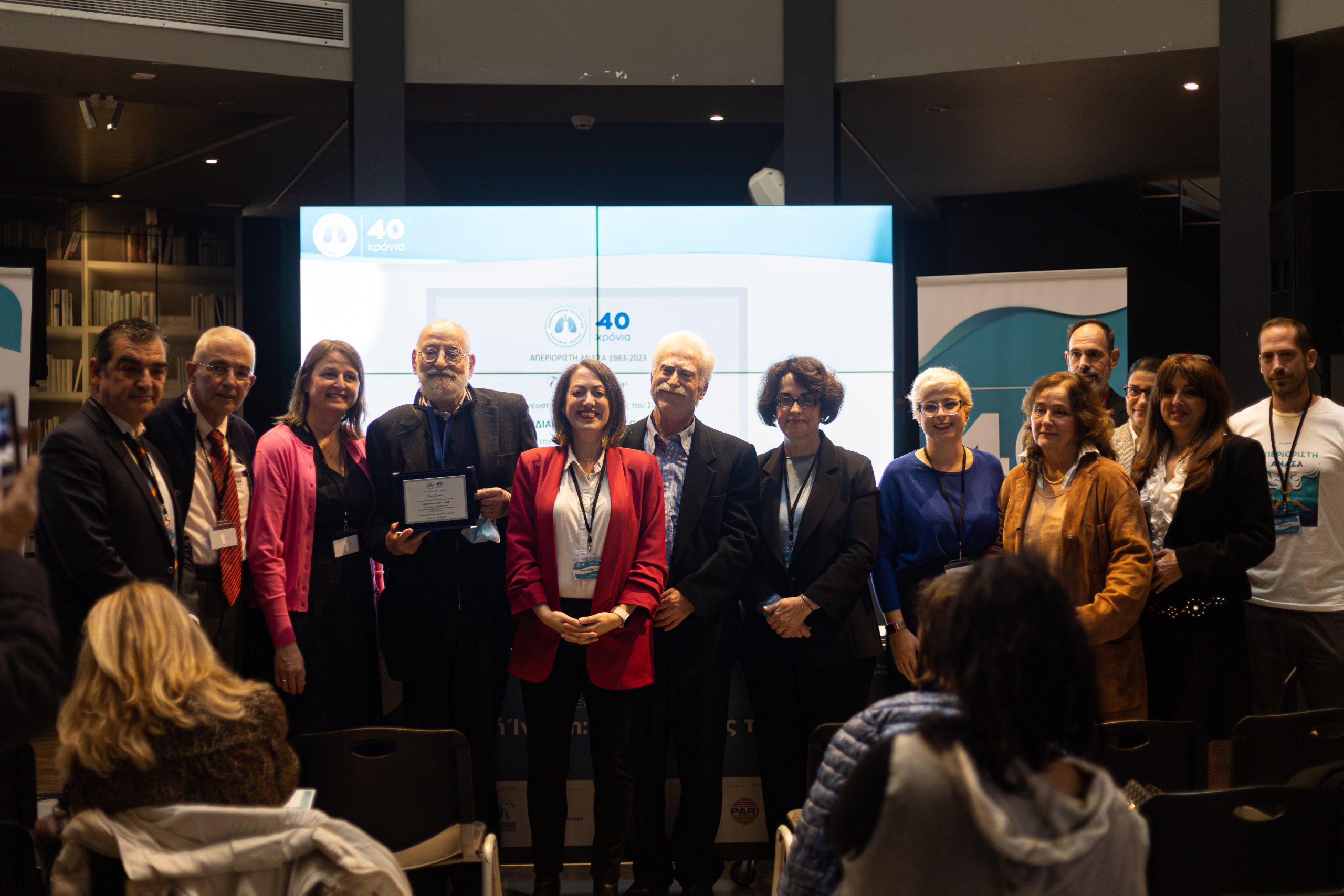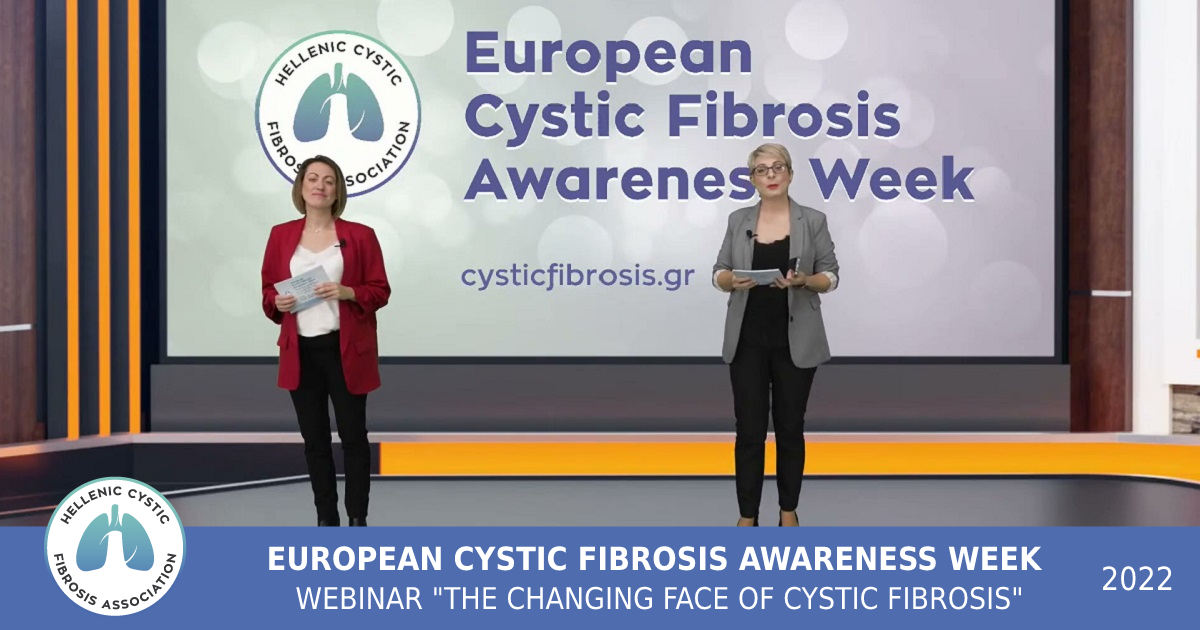13/11/2022
European Cystic Fibrosis Week
The Press Conference of the Hellenic Cystic Fibrosis Association
On the occasion of the events for the European Cystic Fibrosis Week and the 40th anniversary of the Hellenic Cystic Fibrosis Association (H.C.F.A.), the Board of Directors of the Association held a press conference in Athens on Thursday, November 10, 2022.
Watch the full video of the Press Conference here.
Watch the statements of all the speakers on the YouTube channel of the Hellenic Cystic Fibrosis Association here.
The press conference was organized by the Hellenic Cystic Fibrosis Association in the context of raising awareness and informing the wider community about Cystic Fibrosis, the most common hereditary disease in the white race, and one of the most common rare diseases, with symptoms starting in infancy. It is the most common hereditary disease in the country, with about 800 patients and an extremely high number of carriers reaching 500,000, equivalent to 4-5% of the general population of the country. It is estimated that about 1 in 2,000-2,500 children are born with Cystic Fibrosis. Worldwide the number of patients is 80,000-100,000 and in Europe 50,000. A Cystic Fibrosis patient needs about 3-4 hours a day for treatment.
Cystic fibrosis is caused by a mutation of a gene on the seventh chromosome. Its main characteristic is the appearance of highly viscous and dehydrated secretions in various organs and glands of the body, resulting in the gradual destruction of vital organs and ultimately in their failure. For patients in end-stage respiratory failure the only survival option is lung transplantation.
The Hellenic Cystic Fibrosis Association was founded in 1983 in Athens and is one of the longest standing patient associations in Greece, having managed to change the map of the disease in the country through the voluntary teamwork of its members in continuous cooperation with the State and the institutions. With the progress of medical discoveries, the survival rate of patients is constantly increasing and the disease is gradually transformed from a fatal to a manageable chronic disease
The event began with a video message from the Deputy Minister of Health, Ms Asimina Ganga, who stated: “The situation of Cystic Fibrosis patients has changed dramatically in recent years. We have new drugs, as well as the possibility of lung transplantation. Soon we will have a law on transplants. We have already placed coordinators in the units and we will have more donors. It is really exciting that we have so many more drugs and a better quality of life for patients. The research continues and I hope that soon all Cystic Fibrosis patients will have a normal life and a completely normal life expectancy.“
“During the 40 years of the Association’s operation, we have managed to improve the lives of patients and change the map of the disease in Greece: from a pediatric disease with low life expectancy and few adult patients, it is gradually becoming a chronically manageable disease. The teams are achieving miracles. That’s how we did it”, said Anna Spinou, President of the Hellenic Cystic Fibrosis Association, a patient herself. Ms Spinou presented the special characteristics of Cystic Fibrosis and the actions of the Association for:
-informing and raising public awareness
-prevention and early diagnosis so that prospective parents can undergo the necessary molecular testing, which is carried out in state hospitals and private centres. Given the very high number of carriers in our country (500,000 people), molecular screening should be carried out for the whole population and not only for those with affected relatives.
-timely and equitable access for patients to innovative treatments such as the revolutionary treatment that “freezes” the disease and has been successfully administered to Greek patients for the last two years
-the need to strengthen specialised Cystic Fibrosis Centres for both children and adults
-participation in the new Hospital at home programme of the Ministry of Health
-the development of the transplantation programme and the strengthening of organ donation
Innovative Treatments and Holistic Patient Care in specialized Centers
In 2020, following the efforts of the Hellenic Cystic Fibrosis Association in collaboration with the Ministry of Health, the competent bodies and the pharmaceutical company, the early access program to an innovative CFTR Modulator treatment that “freezes” the disease of Cystic Fibrosis was activated in Greece, saving the lives of 30 critically ill Greek patients. Today, all eligible Greek Cystic Fibrosis patients have access to the treatment, and following the recent approval of the European Medicines Agency (EMA) for younger patients, access is gradually being extended to young eligible patients aged 6-12 years.
“We can now talk about the ‘Changing Face’ of Cystic Fibrosis, which is gradually transforming from a fatal disease into a manageable chronic condition. Cystic Fibrosis is the model of the disease that has had the greatest improvement in recent years. This is the result of both scientific research and collective effort,” noted Elpida Hatziagorou, Associate Professor of Pediatrics and Pediatric Pulmonology at the Aristotle University of Thessaloniki (Aristotle University of Thessaloniki), Head of the Cystic Fibrosis Unit of the General Hospital “Hippocrates” and Greece’s representative in the European Cystic Fibrosis Registry (ECFSPR) and Member of the Executive Committee of the ECFSPR.
Along with the medication, organized patient care is extremely critical. “In this part, the role of the Hellenic Cystic Fibrosis Association was very important, because such rare diseases must be monitored in specialized centers by many different specialties of doctors, but also psychologists and physiotherapists. The role of exercise is also very important. Before the modifiers came out, in collaboration with the Association we organized various projects so that children from an early age could exercise systematically, which is inexpensive and improves respiratory function by 10%,” ms. Hatziagorou said.
Based on data collected by the US Cystic Fibrosis Patient Registry (CFFPR) from 30,000 patients, the treatment improved patients’ lung function, reduced the risk of exacerbations by 77%, reduced the risk of lung transplantation by 87% and reduced the risk of death by 74%. Also, starting the innovative CFTR Modulators therapies at an early age was shown to maintain lung function in much better condition compared to starting administration at an older age, indicating the importance of starting treatment in eligible patients as early as possible. Clinical trials of treatments are also underway for the proportion of patients who have either not had the expected benefits from existing innovative therapies, or for patients who are not eligible due to their rare gene mutations. In Greece this percentage is quite high (30%) due to the high molecular heterogeneity of the population, while the corresponding percentage in the US is 5%.
“The Association’s goal is timely and equal access to innovative treatments for all patients,” said Irini Katsini, Vice President of the Hellenic Cystic Fibrosis Association and patient. “Medicine has changed our lives. In 2020 I was in end-stage respiratory failure with oxygen support. My optimism had given way to disappointment. But with the regular intake of the drug I started to rethink life. I can, now, dream and think again not only about tomorrow, but about the near and distant future. I stand on my feet again with strength. In a word, I live. If hope had a name, a face or a form, this in the difficult years of doubt and uncertain future, would be the new medicine. Sometimes prayers meet with the progress of science, and with the assistance of agencies – and I am referring to our Association – results in what is happening to me today.”
Ensuring the necessary infrastructure and conditions in all specialized Cystic Fibrosis Centers and the creation of new centers for both children and adult patients is essential, as Constantina Giannaki, General Secretary of the Hellenic Cystic Fibrosis Association and parent of a Cystic Fibrosis patient, said. The need for adult care is imperative as it increases the survival rate of patients. While in 1980 only 30% of patients made it to adulthood, today this figure is 50% and in 2025 it will reach 75% of patients. “Even if the sufferers receive innovative medication, they still need effective care from a multidisciplinary team of nurses, physiotherapists, dieticians, social workers, pharmacists, and they need monitoring by many medical specialties, such as pulmonologists, gastroenterologists, diabetologists, ENT specialists, orthopedists,” said Ms. Giannaki.
Thanks to the efforts of the Association, in 2012 the Adult Unit of the Sismanoglio was created in an independent wing, while the Association supports all Cystic Fibrosis Centres in every possible way. The Association’s goal is to continue to strengthen the specialized Cystic Fibrosis Centers, with the two largest adult centers operating in Athens (Sismanoglio) for 300 patients and in Thessaloniki (Papanikolaou Hospital) for over 70 more patients, which need immediate staffing. Ms Giannaki stressed that it is important to develop home care in order to decongest hospitals and to support in every way the parents/carers of children. “We are our children’s doctors,” he said.
For children with Cystic Fibrosis and other serious diseases “the hospital has become their second home” as Ioannis Chanakas, Professor Emeritus of Pediatric Pulmonology at the Aristotle University of Thessaloniki (AUTH), Coordinator of the National Cystic Fibrosis Registry, Scientific Coordinator of the working group of the Ministry of Health for the Hospital at Home program, said.
Mr.Chanakas is one of the first scientists in Greece who dealt with Cystic Fibrosis and in 2011 he and his colleagues pioneered the creation of the “Nursing Care at Home” program at the 3rd Pediatric Clinic of the Hippocratic Hospital in Thessaloniki for children who need long-term hospitalization in hospitals as is the case with Cystic Fibrosis patients. The Nursing Care at Home started in 2011 with 10 children and thanks to the support from the Department of Public Health of Macedonia and Thrace and with the help of the organization “The Smile of the Child”, today about 280 children participate in the program. In 2021, a working group was appointed by the Ministry of Health for the nationwide implementation of the programme called Hospital at Home. The Nursing Care at Home provides hospitalization and monitoring of the patient at home by doctors, nurses and health scientists – physiotherapists, psychologists and social workers.
“Children have a great need to be at home, but we also have a great responsibility when we send a patient home and monitor them there. What have we gained from running the The Nursing Care at Home? A year later we have seen better respiratory function compared to hospital stays, a reduction in hospital days, a reduction in ICU admissions, a reduction in costs to the government and a great improvement in the psychological indicators of both the children and the whole family,” he said.
Strengthening the Lung Transplantation Programme
For patients who are not eligible for an innovative treatment due to their rare gene mutations or do not have the expected results from treatments and are in the final stages of respiratory failure, the only survival option is lung transplantation, if they are approved for inclusion on the transplant list and a suitable graft is found in time, through time-consuming procedures.
Until 2014, there was no organised procedure for lung transplants in our country. With the initiatives of the Hellenic Cystic Fibrosis Association in cooperation with the State and the relevant institutions, a transnational cooperation agreement between the National Transplantation Organisation (EOM) and the Austrian Transplant Centre was signed in 2014, saving an average of five patients per year as well as patients with other respiratory diseases, who underwent lung transplantation in Austria from 2015 to 2019. As of June 2019, the National Lung Transplant Program was launched in Greece at the Onassis Cardiosurgery Center with the support of the Onassis Foundation. In Greece, organ donation rates are still low and especially lungs require even more effort than other organs, as they are a fragile graft.
In the last 12 months, three patients with Cystic Fibrosis have lost their lives, who could not be transplanted, while a few months ago the first successful lung transplantation in Cystic Fibrosis in Greece took place.
The Association continues its actions and interventions in order to develop the transplantation program, but also to raise awareness of organ donation in the society, through the successful campaign “Breath unlimited – Be a life donor”, which had the support of the President of the Hellenic Republic Mrs. Katerina Sakellaropoulou, who doubled within two months during covid-19 the number of organ donor registrations in the National Transplantation Organization’s registry.
“One donor can save eight of his fellow human beings, and the probability of needing a transplant is much higher than if we donate a transplant ourselves,” pointed out the Association’s President Anna Spinou. “Organ donation involves many conditions and many patients who are struggling for a second chance at life as was the case with Anastasia Tasoula, the first patient with Cystic Fibrosis to undergo a successful lung transplant in Greece, gaining a second chance at life”.
The Association’s goal is to speed up lung transplantation procedures, to follow up those already transplanted according to European standards, and to increase the number of organ donors, given that Greece is one of the last countries in organ donation.
The National Transplantation Organization (NTO) has selected seven hospitals to participate in the pilot implementation of the institution of a full-time Local Transplant Coordinator (LTC), for the first time in Greece, following the model of Spain and other countries with high rates of organ donation and transplantation, so that “every potential donor becomes a real donor” as Anna Joka from the National Transplantation Organization (NTO) said.
Already, in a six-month period from April 2022 to September 2022, the number of reports of brain deaths has increased fivefold while the number of donors has doubled compared to the entire last year. The Onassis Foundation has taken an initiative in collaboration with the National Transplantation Organization and the Onassis Cardiac Surgery Center to “rebuild” the transplantation sector and to develop and strengthen the culture and expertise in organ donation in our country. This is a holistic intervention with two pillars: the strengthening of infrastructure with the construction of the Onassis National Transplant Centre, and the preparation of a National Action Plan for the development of organ donation and transplantation.


























